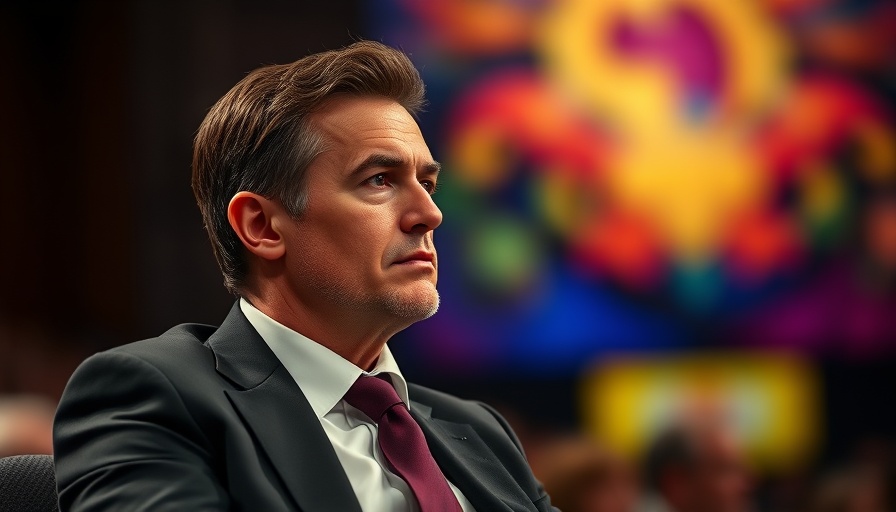
Rethinking Crisis: A Call for Adaptive Leadership
As we navigate the tumultuous waters of today's world, filled with intertwining crises ranging from climate change to political unrest, it's easy to become overwhelmed and fixate on what's going wrong. Yet, there lies a pivotal opportunity in every challenge we face, a sentiment echoed by political economist Yuen Yuen Ang. Her compelling framework, termed 'adaptive political economy,' invites business leaders to view crises not merely as problems to solve but as complex ecosystems rich with potential for growth and innovation.
Understanding Complex Systems: The Forest instead of the Toaster
Imagine standing in a dense rainforest. It bursts with life, showcasing myriad interdependent systems thriving together. This vivid imagery stands in stark contrast to how many leaders perceive their challenges: like a malfunctioning toaster, requiring a straightforward fix. Yet, Ang asserts that to truly lead in this era, we must grasp the complexity of the systems we work within. If we treat crises as complex interconnections, we open ourselves to adaptable thinking, embracing uncertainty rather than shying away from it.
Embracing Complexity: The Key to Sustainable Leadership
In a world marked by uncertainty and rapid change, traditional leadership styles may falter. Leaders who view crises merely as obstacles may find themselves bogged down in reactive decision-making. On the other hand, those who embrace complexity can identify multifaceted solutions, engaging stakeholders in collaborative processes. Adopting an adaptive strategy means not only addressing immediate challenges but also anticipating future needs, creating a resilient organizational culture that thrives on innovation and proactive thinking.
Actionable Insights: Transforming Crisis into Opportunity
To harness the potential embedded in crises, leaders should foster environments conducive to open dialogue and creativity. Begin by redefining your approach to problem-solving:
- Encourage Collaborative Thinking: Foster discussions that examine challenges from multiple perspectives, allowing for diverse solutions to emerge. Schedule regular strategy retreats with diverse teams to brainstorm integrative approaches to crisis.
- Shift Focus from Control to Influence: Instead of attempting to manage every detail, focus on building relationships and influencing factors within your organization. This shift in mindset enables feedback loops that nurture innovation.
- Prioritize Continuous Learning: Cultivate a culture that values learning over perfection. Encourage employees to share lessons learned from failures, enhancing the organization's ability to adapt over time.
Real-World Examples: Leaders who Turned Crises into Catalysts
The business landscape is replete with leaders who have successfully turned crises into remarkable opportunities. For instance, during the COVID-19 pandemic, many organizations pivoted their operations, shifting to remote work seamlessly while increasing digital engagement strategies. Leaders in tech firms effectively implemented flexible working arrangements, while companies in the hospitality sector reimagined their business models, adapting their services to cater to a socially distanced customer base.
Moreover, the retail giant Target is another shining example. Faced with significant disruptions in supply chains, it embraced innovative solutions by enhancing its digital capabilities and investing in contactless delivery options. As a result, sales surged in 2020, showcasing that viewing a crisis as an opportunity can spearhead growth.
Future Predictions: The New Normal of Crisis Management
As we move forward, one thing is clear: crises will continue to emerge and evolve. Leaders who can navigate these waters with an adaptive mindset will likely outperform their peers. Research indicates that companies with resilient leadership strategies will not just survive but thrive amidst uncertainty. By integrating adaptive approaches into everyday practices, leaders can prepare their organizations for the trials that lie ahead, embedding adaptability deeply within their corporate DNA.
Your Path Forward: Rediscovering Opportunity Amid Chaos
Understanding that crises can be viewed through a lens of opportunity is vital for today’s leaders. By adopting an adaptive leadership style, embracing complexity, and nurturing innovative thinking among their teams, executives can transition from reactive management to proactive leadership. This mindset will not only equip organizations with resilience but also empower individuals to tackle future challenges with confidence and creativity.
As we conclude, remember this: the world may present myriad crises, but within each lies the seed of opportunity waiting to bloom. Engage with your team, foster a culture of innovation, and together, transform potential chaos into your greatest chance for growth. The future of your leadership journey starts here—will you take the leap?
 Add Row
Add Row  Add
Add 




Write A Comment